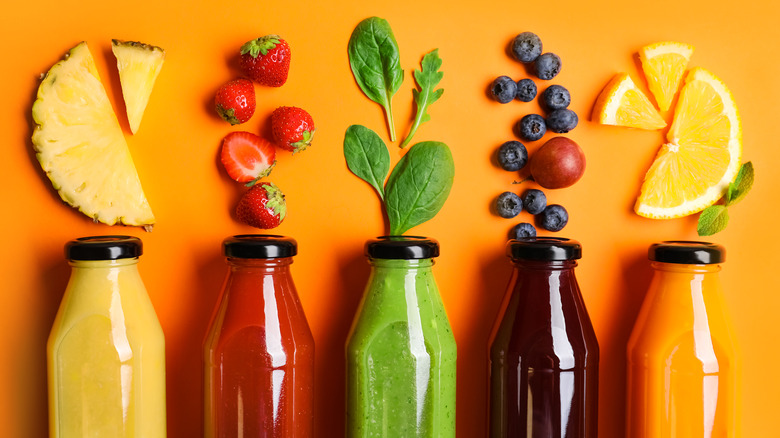Liquid Diets Are Worse Than You Think
Liquid diets are diets that consist largely or entirely of liquids and are mostly or completely devoid of solid foods. They are often used as a way to detox or lose weight and typically aim to replace some or all solid meals during the day (via Spoon University). However, this is a misnomer — while liquid diets are generally portion-controlled and tend to contain fewer calories than solid meals, they are not an effective weight-loss method. That's because they're unsustainable and are not meant to be used as a long-term solution.
Since liquid diets only let you consume around 800 to 1,000 calories per day, your body can end up slowing down to conserve calories. This can actually lead to weight gain when you start consuming more calories again. In addition, liquid diets cannot actually detox or cleanse your body, according to BuzzFeed News. Despite the hype, liquid foods don't have the power to flush out your system or rid your body of toxins, and they don't need to. As it turns out, your body can naturally do this all on its own, thanks to your liver, kidneys, and lungs.
The risks of liquid diets
In addition to not being an effective detox or weight loss method, there are a number of risks associated with liquid diets. For instance, consuming an all-liquid diet can potentially leave your body malnourished (via EatingWell). That's because there is a difference in the way your body absorbs nutrients in liquids vs. solids. While juices and liquids contain vitamins and minerals, they do not have protein, fiber, and fat. Not eating these essential nutrients can eventually lead to headaches, pangs of hunger, and even diarrhea.
Because of this lack of fiber, you're also less likely to absorb all the available nutrients in liquid foods, which can make you nutrient-deficient. "The sugars (glucose and fructose) in the juice will cross the intestinal wall much more quickly without the soluble fiber present in whole fruit, because that fiber barrier will be missing," Dr. Rachele Pojednic, an assistant professor of nutrition at Simmons College, told EatingWell.


